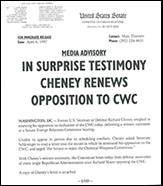Ambassador Rogelio Pfirter, Director General of OPCW, was the featured speaker in a Bipartisan Task Force on Nonproliferation event on Capitol Hill Today. Representatives Edward Markey (D-MA) and Christopher Shays (R-CT), Co-Chairs of the Task Force, hosted the meeting.
The meeting commenced with a background on the CWC and introduction of Ambassador Pfirter by Rep. Markey, followed by a few remarks from Rep. Shays.
Pfirter began by addressing the destruction of chemical weapons stockpiles, an issue likely to be discussed at the review conference next week, and one of particular interest to an audience on Capitol Hill. The U.S. is unlikely to meet the OPCW destruction deadline of 2012, estimating instead that it will take until 2023. Pfirter applauded U.S. efforts thus far, and urged that the U.S. do everything possible – including authorize more funding – to continue to try to meet the 2012 deadline. He insisted that missing the deadline would not be trivial from the perspective of the treaty, but maintained that making it clear that the U.S. and Russia (with is also unlikely to meet the deadline) are doing the best that they can will be key in how the 2012 deadline is dealt with. Pfirter encouraged the U.S. to take chemical weapons destruction seriously, not just as part of their treaty obligations, but also to show leadership in this area and set an example for other nations. He believes that coming to conclusions about holding the U.S. and Russia in treaty noncompliance is premature, and that the Reveiw Conference is too early to make any decisions regarding it.
Pfirter also touched on “other chemical production facilities” (OCPF’s) and a need to increase inspections of them. He acknowledged the perception of some developing nations where the OCPF’s are primarly located that increased inspections were part of a “political agenda”, and disupted it, saying that regardless of where facilities are located, the OPCW needs to inspect them.
A main element of the CWC that makes it an effective arms control agreement is that it boasts 183 states parties. However, 12 nations remain outside, so CWC universality is still an issue and Pfirter discussed some of the non-members and ongoing efforts by the OPCW to bring all nations under the convention.
While fielding questions from the audeinece, the Director General was asked about Riot Control Agents and non-lethal chemical weapons and whether their coverage under the CWC would be discussed at the Review Conference. Because it is a very political issue to address without significant technical background, Pfirter confirmed that it was unlikely to be discussed in detail at the conference. However, the OPCW Scientific Advisory Board is looking in it so that in the future there can be an informed debate.
All told, it was a very candid discussion of some of the challenges facing the CWC. It also provided a diplomatic balance of giving the U.S. a pat on the back for all of the work they have done in destroying CW stockpiles, and all of the aid they have given to help other nations with destruction, but still reinforcing the fact that the U.S. is not done yet, and more action needs be taken to show the world that they are serious about trying to meet the 2012 deadline.
This site has an overview of some of the issues that will be discussed at the Second Review Conference next week, as well as a full list of articles and reports published on them.
